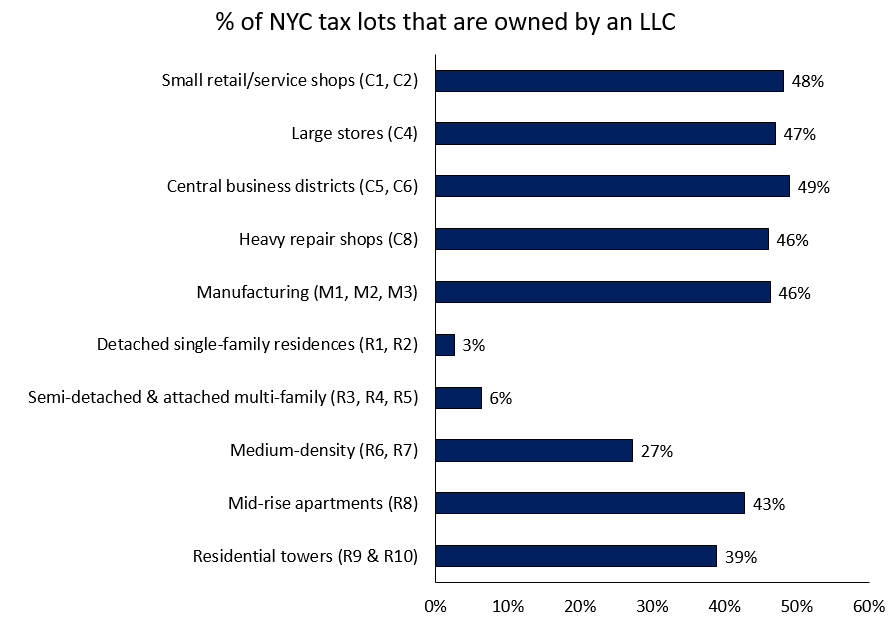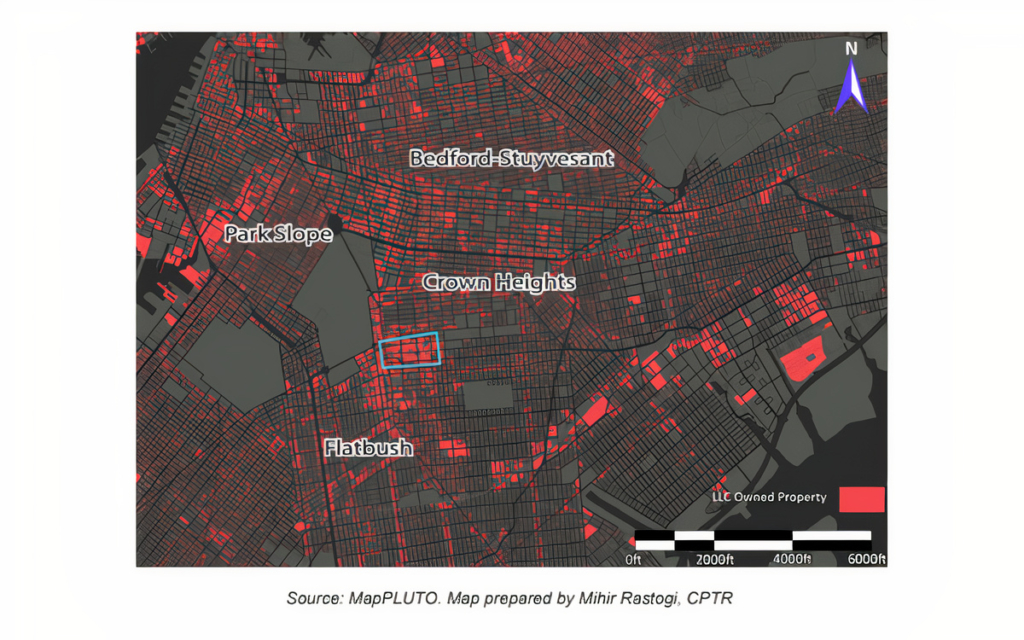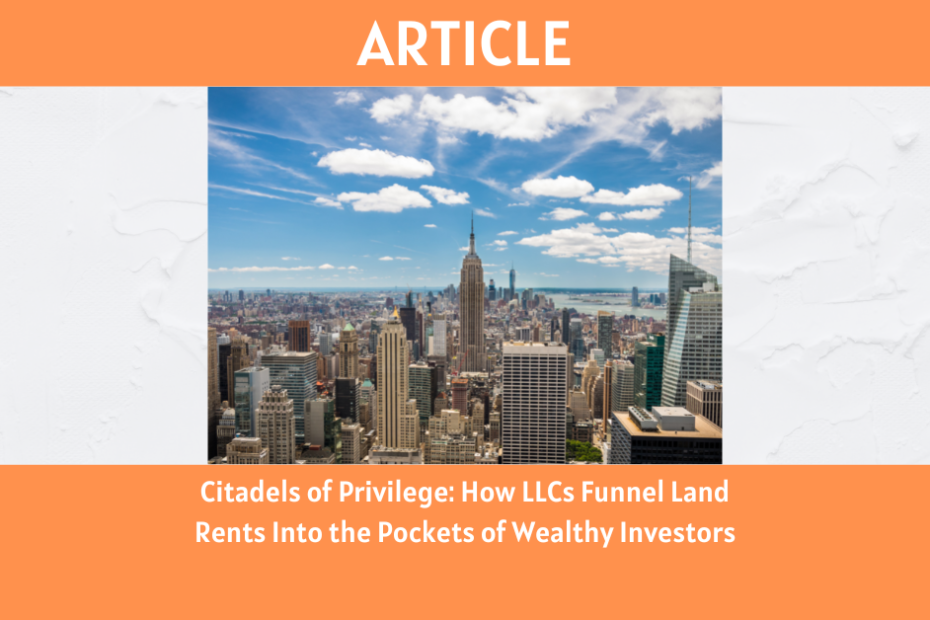As housing costs continue their inexorable climb upwards in cities across the US, concern is mounting about the role played by corporate investors. Referred to as the ‘financialization’ of housing, real estate is being hoovered-up by massive investment funds with names like BlackRock and Blackstone. With little personal connection to their tenants, these faceless investors engage in ruthless profit-seeking, deploying evictions as a weapon to raise rents as much as possible. The presence of these well-heeled investors is also driving prices upwards, pushing homeownership even further out of reach for the middle-class. During the post-pandemic economic turmoil, investors have ramped-up their efforts, buying fully one-quarter of single family homes last year.
While attention is often paid to the institutional investors, one overlooked component of this shifting economic quicksand is the growing presence of limited liability companies (LLCs) in the real estate market. This legal structure is favored by investors looking to profit by grabbing land, avoiding the tax collector, and dodging the ire of the public eye. In this article we’ll describe how the LLC legal structure became a favorite weapon for real estate speculators, explain how they widen inequality, present our own research into their presence in New York City (NYC), and suggest some policy tools to uproot this pernicious weed ensnaring our cities.
Limited liability companies were first created in 1977 as a legal method for Wyoming’s oil and gas investors to be protected from personal liability if their ventures failed. LLCs saw minimal use for real estate investment until 1988 when the IRS ruled that they should not be taxed in the same way as corporations. When combined with the benefits of anonymity, this made LLCs a highly attractive option for real estate investors during the 1990s housing boom, and a flurry of statutes saw them enabled in all 50 states by 1996. By 2018, nearly 1 in 6 rental properties nation-wide were owned by an LLC, an increase from 1 in 8 three years prior. More LLCs are formed each year than corporations, and fully one fifth of business profits are paid out to an LLC, most of which derives from real estate in one way or another. Our investigations have revealed that 13% of all properties in NYC are owned by LLCs, representing $133bn worth of assessed market value, and fully 40% of all real estate in the city by land area.
LLCs enjoy three key privileges that are highly favored by real estate investors. As the name implies, liability is limited within the confines of the LLC, which can make it hard for both lenders and tenants to seek redress against landlords’ personal assets during a dispute. LLCs enjoy minimal requirements to publish information about their ownership or financial status, making it hard for tenants to figure out who exactly owns their home, and enabling investors to remain entirely anonymous even while buying-up significant chunks of land. Profits earned from rental income or increases in real estate values do not pay any corporate profits. Instead, the LLC’s profits are ‘passed-through’ to be taxed as personal income of the owners. Where the true beneficial owners of an LLC are unknown, they can make it difficult for the IRS to ensure that these profits are even being taxed at all. Shell LLCs have therefore become a common tool deployed by tax evaders and international criminals engaging in money laundering.
Urban theorist Jane Jacobs well-understood the impact that legal structures had on the lives of city-dwellers when she noted that “private investment shapes cities, but social ideas (and laws) shape private investment.” Likewise, the LLC structure enables investors to purchase small slivers of large, diversified portfolios of real estate, which “benefit investors who want the financial benefits of owning property without the risk and responsibilities of being a landlord.” Such absentee owners have little connection to their tenants and have the explicit financial incentive to extract as much rent as possible without regard to the personal circumstances of the people living in their properties. Indeed, one study found LLC landlords were more likely to allow their properties to deteriorate to reduce their maintenance costs: “by transforming landlords from fully liable owners into partially liable, anonymous investors, the LLC may facilitate profit-seeking strategies that rely more on the extraction of rents than on the maintenance or improvement of the underlying property.” Such strategies result in very real harm to tenants living under LLC landlords. This finding was replicated in a 2019 investigation in New York State, which revealed that the legal shield provided by LLC status made it difficult to enforce building code violations, allowing problems to persist, ultimately putting the health and safety of tenants at risk. Some tenants also missed out on receiving emergency rental support during the Covid-19 pandemic because they could not track down their anonymous LLC landlord to sign the relevant paperwork.
LLCs are a key mechanism behind the US’ widening chasm of inequality. LLCs enable faceless investors to gobble-up scarce land in our cities, squeeze tenants for one-quarter to one-half of their income, and funnel these revenues upwards into the pockets of the most privileged members of society. One study that tried to trace the actual investors using the veil of an LLC found that they were disproportionately owned by the wealthy, were much more common among White households, and were primarily controlled by men. Unsurprisingly, the piece ultimately labeled LLCs, “Citadels of Privilege.” Profits for these LLCs come from rental income paid by tenants, unearned speculative gains from land value appreciation, and access to tax credits subsidized by the taxpayers. For example, LLCs have owned 60% of all projects that have benefited from historic tax credits. Thus, while the system of LLCs was “ostensibly designed to encourage rehabilitation of heritage buildings, [it] ultimately encourages rent-seeking by “powerful but undeserving constituencies.”
One New York Times investigation found that LLCs are being used to avoid taxes by wealthy Americans and as shell companies by foreign plutocrats seeking to keep their identities hidden while purchasing Manhattan real estate. These investors were primarily buying pied-à-terre condominiums, and bought nearly half of all properties worth over $5 million that changed hands in 2015. They found that fully one third of units in the Time Warner Center were owned by foreigners, many of whom had had their finances investigated by their own governments. Many of these properties lie vacant for much of the year, serving instead as a way to speculate on the rising demand for premium locations in NYC. The anonymity afforded by the LLC structure has made it difficult for researchers in Detroit, Seattle, and New York to study real estate speculation and perverse landlord behavior.
Here at the Center for Property Tax Reform, we have been working to lift the veil on the prevalence of LLC ownership across NYC. In a soon-to-be-released research report, we find that LLCs own 13% of all properties in the city and close to 43% of those in Manhattan. Our analysis suggests that LLCs are preferentially buying larger properties, those which are close to water, on corner lots, and closer to subway stations. All of these factors suggest that LLCs are attracted to properties with serious potential for rising land values as their location becomes more hotly prized, presenting an opportunity for investors to enjoy speculative profits. Likewise, we find that LLCs are much more likely to own properties with more generous planning permissions, owning just under half of all properties zoned for either commercial, mid-rise apartments or residential towers. We also find suggestions that LLCs are ‘land banking’ on properties being granted additional planning permissions, being 1.5 percentage points more likely to own properties that have been rezoned in the past decade.

In some areas of the city, LLCs are quickly becoming the dominant form of land ownership. For example, the map below depicts the high levels of LLC involvement in Flatbush, southeast of Prospect Park. Within the eight residential blocks bordered by Linden Blvd and Flatbush, Clarkson & New York Aves, 70% of all land is owned by an LLC. Home to many New Yorkers of Haitian, Trinidadian and Dominican descent, Little Caribbean’s distinctive character could be under threat of gentrification if this high number of corporate investors decide to start aggressively pursuing evictions and redevelopment to target a higher-income segment of the rental market.

How can communities and policy-makers push back against the growing presence of these anonymous LLC investors in the housing market? Tech nonprofit JustFix.nyc is helping to shed light on who owns what in NYC, with their easy-to-use tool for looking up the portfolios of property owned by a given landlord. However, where the landlord is an LLC, it can remain difficult to identify the actual investors involved. It is crucial therefore that LLCs be required to disclose their beneficial owners. For example, legislation put forward by City Councilman Ben Kallos would require anyone who owns more than 5% of an LLC to disclose their name when filing for an occupancy permit. Information disclosed by LLCs should be combined into a landlord registry, such as Minneapolis’ rental license database, which will better-equip tenants to seek redress against landlords who are engaging in code violations. Greater transparency will also ensure that communities can raise the alarm when corporate investors are buying up a lot of properties within one neighborhood.
While a law signed in 2019 requires that ownership information be disclosed to NYC’s Department of Finance during residential property transactions, this only applies to properties with between one to four units, and the information is not available in a public database. This type of information is already readily searchable in Britain and New Zealand. Legislation recently proposed by Assembly member Emily Gallagher and Senator Brad Hoylman would help resolve this issue by assigning an identification number to every beneficial owner of an LLC, including for foreign companies, and presenting this information in a public-facing database. This could help curb money laundering, tax evasion and code violations that are typical of LLC investors.
Other mechanisms for pushing back against the privileged power of LLCs include minimum capitalization requirements and minimum liability insurance, which ensure that tenants have sufficient recourse available when they pursue torts against LLC landlords. Greater transparency and legal redress will help empower tenants against neglectful investors. However, if future research continues to show that the LLC shield is privileging the wealthy while making life worse for tenants, the justification for retaining this investment class will only continue to crumble.
Additional Links:
- Who owns what in NYC? – a tool built by JustFix.nyc to help you identify your landlord’s portfolio.
- LLCs in NYC – our map for identifying vacant or underutilized parcels in NYC that are owned by an LLC
- Our recent webinar in which Professor Elora Lee Raymond demonstrates that corporate investors have been buying-up housing in distressed areas since the COVID-19 pandemic began.

